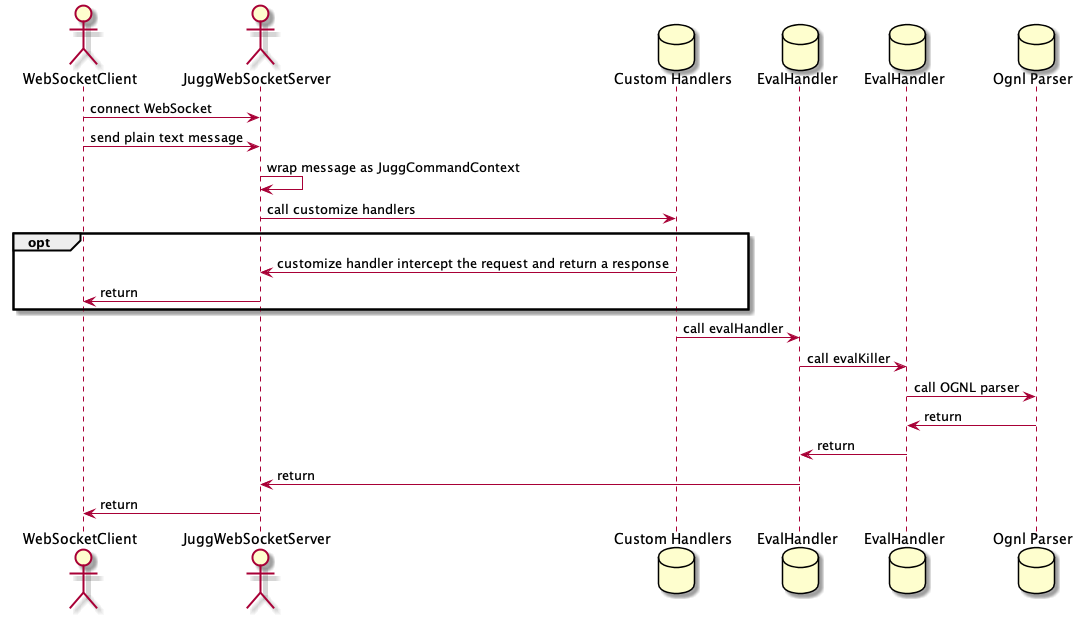Jugg is a C/S Structure OGNL parser, or can think of it as a Java REPL.
Feed easy to use Jugg to debug your Java's program as enjoyable as Python REPL.
<dependency>
<groupId>com.xhinliang</groupId>
<artifactId>jugg</artifactId>
<version>2.1.3</version>
<exclusions>
<exclusion>
<groupId>org.slf4j</groupId>
<artifactId>slf4j-jdk14</artifactId>
</exclusion>
</exclusions>
</dependency>
We introduce Jugg's core concept by a simple Spring Boot project.
IBeanLoader is a interface, We use it to define how to load a Class or a objact (We will call it Bean in the future).
With IBeanLoader, we have the freedom to control the logic of the Class loading and Bean loading of the OGNL parser for a better operational experience.
We provide an flexible implementation of IBeanLoader as FlexibleBeanLoader.
public static void main(String[] args) {
ConfigurableApplicationContext configurableApplicationContext = new SpringApplication(MainApp.class).run(args);
// jugg threads.
IBeanLoader beanLoader = new FlexibleBeanLoader() {
@Override
protected Object getActualBean(String name) {
return configurableApplicationContext.getBean(name);
}
@Override
public Object getBeanByClass(@Nonnull Class<?> clazz) {
return configurableApplicationContext.getBean(clazz);
}
};
JuggEvalKiller evalKiller = new JuggEvalKiller(beanLoader);
List<IJuggInterceptor> handlers = Lists.newArrayList(//
new JuggLoginHandler((username, password) -> password.equals(USER_PASSWORD.get(username))), //
new JuggAliasHandler(beanLoader), //
new JuggCheckHandler(commandContext -> true), //
new JuggEvalHandler(evalKiller) //
);
JuggWebSocketServer webSocketServer = new JuggWebSocketServer(JUGG_PORT, handlers, MainApp::getResourceAsFile);
webSocketServer.startOnNewThread();
}JuggCommandContext is an abstraction of a request, containing information about the user, requesting content, and so on.
IJuggEvalKiller decides how to execute a JuggCommandContext.
public interface IJuggEvalKiller {
/**
* Eval a command and get the value.
* @param commandContext command & context from client.
* @return eval result.
*/
Object eval(CommandContext commandContext);
}JuggWebSocketServer is a WebSocket Server for WebSocket client's request.
JuggWebSocketServer webSocketServer = new JuggWebSocketServer(JUGG_PORT, handlers);
webSocketServer.startOnNewThread();The OGNL syntax is generally similar to the normal Java syntax, but there still are some differences, so please refer to the official documentation.
Jugg extends OGNL with IBeanLoader, which makes it easier to use.
With IBeanLoader, Jugg can automatically load the Bean.
For example, you can combine Spring with Jugg.
ConfigurableApplicationContext configurableApplicationContext = new SpringApplication(MainApp.class).run(args);
IBeanLoader beanLoader = new IBeanLoader() {
@Nullable
@Override
public Object getBeanByName(String name) {
try {
return configurableApplicationContext.getBean(name);
} catch (NoSuchBeanDefinitionException catchE) {
return null;
}
}
@Nullable
@Override
public Object getBeanByClass(@Nonnull Class<?> clazz) {
try {
return configurableApplicationContext.getBean(clazz);
} catch (NoSuchBeanDefinitionException e) {
return null;
}
}
// more
};# userService is a Spring bean
# u can use it directly, because jugg will call Spring to ininitialize it.
> userService.getById(123L)
{
"id": 123,
"name": test
}OGNL needs FQCN(Fullly Qualified Class Name) to call a static method by default, but you can use SimpleClassName in Jugg.
// load all the Class of ClassLoader, as map(simpleClassName -> fullyQualifiedClassName)
Map<String, String> clazzMap = new HashMap<>();
Configuration configuration = new ConfigurationBuilder() //
.setUrls(Stream.of(ClasspathHelper.forPackage("com"), ClasspathHelper.forPackage("org"), ClasspathHelper.forPackage("net")) //
.flatMap(Collection::stream) //
.collect(Collectors.toSet())) //
.setScanners(new SubTypesScanner(false));
Reflections reflections = new Reflections(configuration);
reflections.getAllTypes().forEach(s -> {
String simpleClassName = s.substring(s.lastIndexOf(".") + 1);
clazzMap.putIfAbsent(simpleClassName, s);
});
IBeanLoader beanLoader = new IBeanLoader() {
@Nonnull
@Override
public Class<?> getClassByName(String name) throws ClassNotFoundException {
try {
return Class.forName(name);
} catch (ClassNotFoundException classNotFound) {
String retryClassName = clazzMap.getOrDefault(name, name);
return Class.forName(retryClassName);
}
}
// more
};> @Maps@newHashMap()
{ }You can customize the name of your Class or Bean by alias command.
> alias target M Maps
done
> @M@newHashMap()
{ }Jugg use plain text WebSocket protocol as Java REPL.
So any WebSocket client can be used directly, even of wsdump.py.
We have two offical client now
weba web client implement byReact.node-clienta cli client implement byNode.js.
MIT License
Copyright (c) 2019 XhinLiang
Permission is hereby granted, free of charge, to any person obtaining a copy
of this software and associated documentation files (the "Software"), to deal
in the Software without restriction, including without limitation the rights
to use, copy, modify, merge, publish, distribute, sublicense, and/or sell
copies of the Software, and to permit persons to whom the Software is
furnished to do so, subject to the following conditions:
The above copyright notice and this permission notice shall be included in all
copies or substantial portions of the Software.
THE SOFTWARE IS PROVIDED "AS IS", WITHOUT WARRANTY OF ANY KIND, EXPRESS OR
IMPLIED, INCLUDING BUT NOT LIMITED TO THE WARRANTIES OF MERCHANTABILITY,
FITNESS FOR A PARTICULAR PURPOSE AND NONINFRINGEMENT. IN NO EVENT SHALL THE
AUTHORS OR COPYRIGHT HOLDERS BE LIABLE FOR ANY CLAIM, DAMAGES OR OTHER
LIABILITY, WHETHER IN AN ACTION OF CONTRACT, TORT OR OTHERWISE, ARISING FROM,
OUT OF OR IN CONNECTION WITH THE SOFTWARE OR THE USE OR OTHER DEALINGS IN THE
SOFTWARE.




